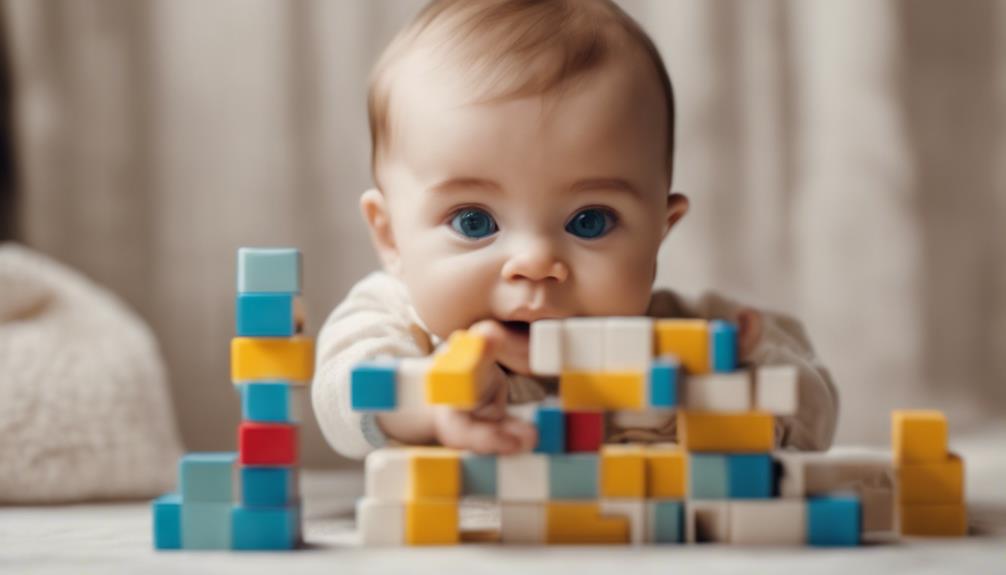Are you curious if your baby is ahead of the curve? Keep an eye out for early signs like being able to sit independently by 4.9 months old, standing steadily at 7.7 months old, and grasping objects with ease at 6.3 months old. Be on the lookout for mental breakthroughs such as problem-solving abilities and language development. Language milestones may include first words around 5.53 months and a vocabulary of 4-6 words by 10.5 months. Pay attention to social abilities like making eye contact and displaying empathy. If these abilities seem familiar, you may have a little overachiever on your hands. Continuously monitor these milestones as there is still so much more to learn about your baby’s incredible growth.
Key Takeaways
- Early achievement of developmental milestones like sitting, standing, crawling, and walking.
- Rapid language development with early sentence formation and a wide vocabulary.
- Strong problem-solving skills, quick grasp of new concepts, and a thirst for learning.
- Advanced social and emotional skills such as maintaining eye contact, empathy, and mirroring emotions.
- Overall progress in motor skills, communication, social interactions, and adaptability.
Early Motor Skill Development
To assess if your baby is advanced, observe their early motor skill development milestones closely. Early signs of a gifted child often manifest in their physical abilities. By paying attention to these developmental milestones, you can gain insights into your baby's potential.
At around 4.9 months, sitting alone is a key indicator of advanced motor skills. If your baby is able to sit steadily without support at this age, it could be a sign of their advanced physical abilities. Additionally, standing alone well at 7.7 months showcases exceptional balance and strength.
As your baby progresses, crawling upstairs around 10.5 months and walking upstairs by 12.6 months demonstrate advanced coordination and muscle control.
Keep an eye out for fine motor skills like holding objects adaptively at 6.3 months and spontaneous scribbling at 9.1 months, as these are further signs of your child's advanced abilities in motor skill development.
Rapid Cognitive Advancements

Rapid cognitive advancements in babies often reveal themselves through early problem-solving abilities and language development. If your baby shows a knack for figuring out puzzles or mastering complex tasks at an early age, it could be a sign of advanced cognitive skills.
Additionally, early language development, like speaking in sentences or using a wide vocabulary, may indicate rapid cognitive growth. Keep an eye out for exceptional memory retention and a quick grasp of new concepts, as these are key indicators of cognitive advancement in babies.
Gifted babies might also exhibit heightened sensory awareness, showing curiosity in exploring their environment and engaging with various stimuli. Recognizing patterns, making connections between objects or ideas, and displaying a strong thirst for learning are all early signs of cognitive advancement worth noting in your baby.
Embrace these signs and continue to nurture your little one's cognitive development through engaging activities and opportunities for exploration.
Broad Language Milestones

Early language development in gifted babies often showcases a range of broad milestones that signify advanced communication skills. Gifted infants may reach language milestones earlier than their peers, such as saying their first words around 5.53 months or having a vocabulary of 4-6 words by 10.5 months. These early language indicators, like social smiling at 1.05 months and searching with eyes for sound at 1.54 months, highlight their advanced linguistic abilities. By 5.53 months, gifted babies might start to say 'Dada' or equivalent sounds, further demonstrating their early language skills. As they continue to grow, by 25.2 months, gifted infants could already be capable of giving their full name, showcasing strong language development.
| Language Milestones | Age | Significance |
|---|---|---|
| First Words | 5.53 months | Early onset of verbal communication |
| Vocabulary Growth | 10.5 months | Rich vocabulary for age |
| Social Smiling | 1.05 months | Social engagement through facial expressions |
Fine Motor Skill Proficiency

To gauge your baby's fine motor skill proficiency, observe early signs like grasping objects with intent as young as 2.1 months.
As your baby grows, look for precise hand-eye coordination around 6.3 months and the emergence of early writing abilities by 9.1 months.
These milestones can indicate advanced fine motor skills and potential giftedness in your little one.
Grasping Objects Early
Developing strong fine motor skills in your baby can be observed through their early ability to grasp objects adaptively. Gifted babies might showcase this proficiency as early as 6.3 months, indicating advanced development in fine motor skills.
When your little one demonstrates mastery in grasping objects at a young age, it signifies a high level of fine motor abilities. This early skill in object manipulation is a positive sign of advanced development and could be a hint of their potential in this area.
As your baby learns to grasp objects early, providing them with a variety of objects to practice with becomes crucial. Encourage their exploration and offer safe items for them to hold and manipulate. Through consistent practice and support, your baby can enhance their fine motor skills and continue to advance in their abilities.
Celebrate each milestone they reach in grasping objects, as it's a stepping stone towards even greater fine motor skill development.
Precise Hand-Eye Coordination
Mastering precise hand-eye coordination is a pivotal indicator of fine motor skill proficiency in babies. Gifted infants may showcase advanced abilities in this area, like holding objects adaptively as early as 6.3 months. Observing your baby's development in activities such as scribbling spontaneously (around 9.1 months) and folding paper (approximately 14.7 months) can provide valuable insights into their fine motor skills.
As your baby grows, their skills may progress to turning pages of a book around 33.6 months and eventually drawing intricate figures with details like necks, hands, and clothes, typically by 50.4 months. Recognizing these milestones can help you identify the advanced capabilities of your little one and nurture their talents effectively.
Encourage activities that promote hand-eye coordination, such as playing with building blocks or puzzles. Remember, every baby develops at their own pace, so celebrate their progress and provide a supportive environment for their continued growth in fine motor skills.
Early Writing Abilities
Your baby's advanced fine motor skills may manifest through early writing abilities, indicating a potential proficiency in precise hand movements and coordination. Gifted babies often exhibit a keen interest in drawing or writing at a young age, showcasing their advanced fine motor skill development.
By around 2 years old, you may observe your gifted baby holding a pencil correctly, attempting to draw recognizable shapes, or even scribbling with purpose on paper. These early writing abilities are clear indicators of your baby's fine motor skill proficiency.
As a parent, pay attention to signs like your baby tracing lines, making intentional marks, or trying to copy letters. These actions not only demonstrate your baby's developing fine motor skills but also hint at potential giftedness in the field of early writing abilities.
Encourage and nurture this interest by providing age-appropriate writing tools and activities that support their fine motor skill development. Celebrate their efforts and progress, fostering a love for writing from a young age.
Consistent Progress Across Areas

Look for a pattern of steady advancement in various developmental areas to determine if your baby is advanced. Consistent progress across different domains can be a strong indicator of giftedness in a young child. Characteristics of a Gifted individual often include excelling in multiple areas simultaneously, showcasing a well-rounded set of skills. When evaluating your baby's development, keep an eye out for the following signs of advanced abilities:
- Motor Skills: Notice how your baby's physical coordination and abilities progress consistently.
- Language Development: Look for advancements in both understanding and communication skills.
- Social Interactions: Observe how your baby interacts with others and how these interactions evolve over time.
- Problem-Solving Abilities: Watch for improvements in your baby's problem-solving skills and adaptability.
- Overall Development: Assess the overall growth and milestones achieved in different areas to see a holistic picture of your baby's progress.
Social and Emotional Awareness

Is your baby showing advanced social and emotional awareness? Look out for signs like meaningful eye contact, empathy towards others, and a wide range of emotions.
These early bonding skills and connections are key indicators of your baby's heightened social and emotional intelligence.
Observing these behaviors can help you understand and nurture your advanced little one's emotional awareness.
Early Bonding Skills
Developing early bonding skills, such as making eye contact and showing recognition towards loved ones, is a key indicator of social and emotional awareness in gifted babies. These skills not only strengthen the connection between you and your child but also provide insights into their advanced development.
Here are five signs to look out for in your little one:
- Engaging Eye Contact: Gifted babies often maintain prolonged eye contact, demonstrating attentiveness and connection.
- Recognizing Familiar Faces: Your child may show excitement or comfort around family members, indicating a strong bond.
- Responsive Smiling: Quick and genuine smiles in response to interactions showcase emotional awareness and engagement.
- Seeking Comfort: Gifted infants may actively seek comfort from caregivers, displaying a sense of trust and attachment.
- Mirroring Emotions: Your baby might mimic your facial expressions, reflecting empathy and social understanding.
Empathy and Connection
Advanced babies often display an innate sense of empathy and connection, showcasing their exceptional social and emotional awareness from a young age. Gifted infants show early signs of empathy by understanding and responding to emotions in others. They engage in meaningful eye contact and demonstrate a wide range of emotions, indicating a high level of social and emotional awareness.
These babies also exhibit a strong sense of self-awareness, picking up on complex emotional cues in their environment. Early signs of emotional regulation and empathy towards others' feelings are common in advanced babies, highlighting their advanced social and emotional skills. Additionally, gifted infants tend to prefer social interactions and may show a preference for playing alongside others, emphasizing their early social and emotional awareness.
Encouraging and nurturing these traits in your baby can further enhance their ability to connect with others and navigate their emotions effectively. By fostering a supportive and understanding environment, you can help your baby thrive in their social and emotional development.
Seeking Expert Guidance

To guarantee expert guidance in determining your baby's advanced development, consider consulting pediatricians or child development specialists. These professionals can provide valuable insights into your baby's abilities and offer guidance on how to support their growth.
Here are some practical steps to help you navigate this process:
- Reach out to early childhood educators or psychologists with experience in identifying gifted traits in young children.
- Explore local resources such as early intervention programs or gifted education services for additional support and assessment.
- Consider participating in developmental screenings or assessments to gain a thorough understanding of your baby's cognitive, social, and physical development.
- Keep a detailed record of your baby's milestones, behaviors, and interactions to share with experts for a more detailed evaluation.
- Don't hesitate to ask questions and seek clarification from professionals to make sure you have a clear understanding of your baby's unique strengths and areas for growth.
Frequently Asked Questions
How to Identify a High IQ Baby?
To identify a high IQ baby, notice early signs like advanced problem-solving skills, exceptional memory, curiosity, and communication abilities. Seek expert assessments for confirmation. Trust your observations and nurture their potential through engaging activities and supportive environments.
How Do You Identify How Advanced a Child Is in Their Development?
To identify how advanced your child is in their development, notice early milestones, exceptional focus, problem-solving skills, curiosity, social interactions, emotional intelligence, and motor skills. Consider birth weight, intelligence, and cognitive abilities as factors.
Is My Child Gifted or Just Smart?
You might wonder, is your child gifted or just smart? Look for early signs like hitting milestones early, exceptional memory, and a strong thirst for learning. Observing closely and seeking guidance can help clarify.
How to Tell if Your Toddler Is Advanced?
Noticing if your toddler is advanced involves looking for early problem-solving skills, advanced language development, exceptional memory, interest in complex topics, and engaging imaginative play. These signs can indicate cognitive advancement in your child.
Conclusion
To sum up, acknowledging your baby's advanced development can be both exciting and reassuring. By observing key indicators such as early motor skills, cognitive advancements, language milestones, and social awareness, you can better understand their progress.
Remember, every child is unique, and seeking expert guidance when needed can provide valuable support and guidance. Trust in your instincts and enjoy the journey of watching your little one grow and thrive.
Remember, Rome wasn't built in a day, and neither is your baby's development!










